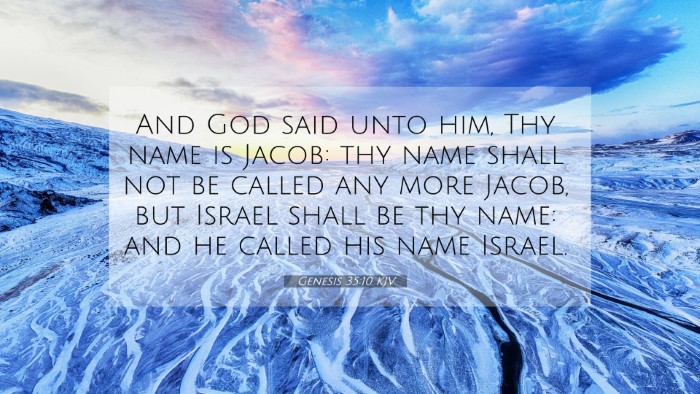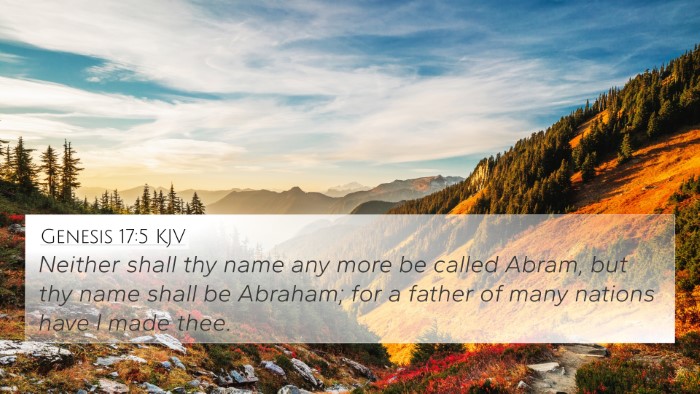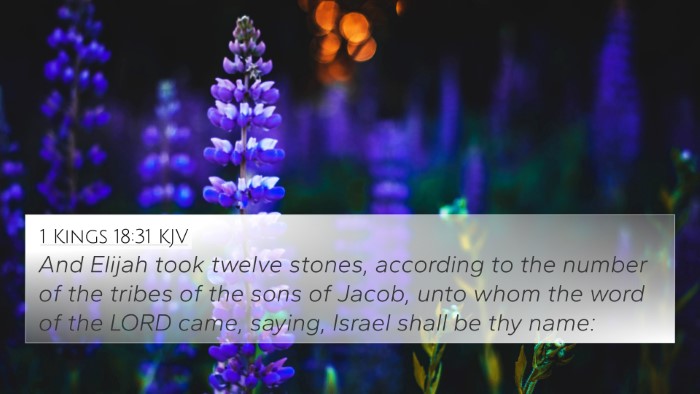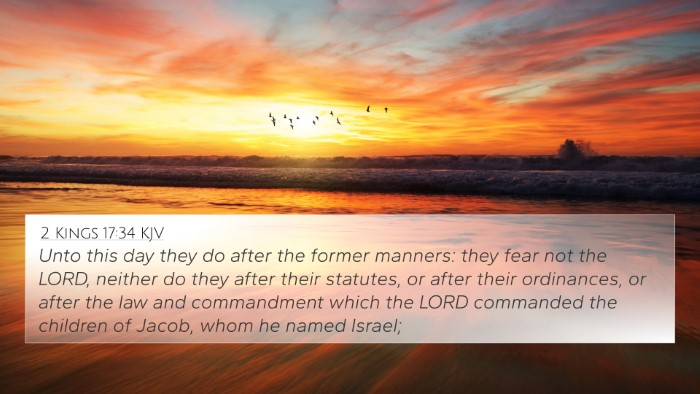Understanding Genesis 35:10
Genesis 35:10 states, "And God said to him, 'Your name is Jacob; no longer shall your name be called Jacob, but Israel shall be your name.' And he called his name Israel." This verse plays a significant role in biblical narratives, reflecting themes of identity transformation, divine promise, and covenant relationship.
Meaning and Interpretation
Throughout the Scripture, name changes signify deep spiritual transformations. In this case, Jacob, whose name means "supplanter" or "deceiver," receives a new name—Israel, meaning "he struggles with God" or "prince of God." This transition marks a pivotal moment in Jacob's life, establishing his role in God's redemptive plan.
Theological Insights
According to Matthew Henry, the act of renaming Jacob is emblematic of his new relationship with God. He emphasizes that after wrestling with the divine (as described in Genesis 32), Jacob is granted a new identity which represents God's favor and blessing on his life.
Albert Barnes provides additional commentary by suggesting that the change of name reflects not only Jacob's personal transformation but also the transformation of his descendants who will become the nation of Israel. This new identity encompasses both struggle and blessing in their collective journey.
Adam Clarke notes the significance of Israel being a name of hope and strength. Israel symbolizes a people who wrestle with God rather than one who simply deceives. The naming represents both a divine calling and a change in nature, foreshadowing Egypt's future exodus and the overarching covenant between God and His chosen people.
Cross-References
Genesis 35:10 has several important connections within the biblical text that deepen our understanding:
- Genesis 32:28 - The actual encounter where Jacob wrestles with the angel of God, receiving his new name.
- Exodus 3:6 - God's revelation to Moses as the God of Abraham, Isaac, and Jacob, highlighting the importance of Jacob's lineage.
- Isaiah 44:1-2 - The promise of restoration to Jacob's descendants, reinforcing the covenant made with Israel.
- Romans 9:6-8 - The apostle Paul discusses the significance of Israel among God’s chosen people, drawing connections to Jacob's identity.
- Luke 1:33 - The anticipation of Jesus' eternal reign, connecting Old Testament identity with New Testament fulfillment.
- Genesis 48:16 - Jacob (now Israel) blesses his grandchildren, imparting the legacy of his new identity.
- Matthew 1:2-16 - A genealogy of Jesus that includes Jacob, establishing the connection between the Old Testament patriarchs and the New Testament.
Thematic Connections
This verse exemplifies several overarching themes in the Bible:
- Identity and Transformation: The shift from Jacob to Israel symbolizes a larger theme of transformation through divine intervention.
- Divine Promise: The reaffirmation of God's covenant with the patriarchs highlights His faithfulness across generations.
- Struggle and Redemption: Israel's name encapsulates the struggle of God’s people, often facing opposition yet emerging victorious.
Practical Application
For believers today, Genesis 35:10 serves as a reminder of God's transformative power in our lives. Just as Jacob was recognized as Israel, we are called to shed our past identities and embrace new life in Christ. This call to transformation is echoed throughout the Scriptures, inviting believers to partake in a renewed relationship with God.
Conclusion
In summary, Genesis 35:10 is a reflective verse that intricately weaves together God's covenant promise, identity transformation, and the significance of Israel within biblical history. Through the insights provided by public domain commentaries, one can appreciate the depth and weight of the text. Furthermore, by exploring the cross-references mentioned, one can recognize the interconnectedness of Scripture and the enduring nature of God's design for His people.
Related Bible Study Tools
In studying Genesis 35:10, various tools for Bible cross-referencing can enhance understanding:
- Bible concordance: To look up meanings and references of specific terms and identities.
- Bible cross-reference guide: That can help identify links between scriptures.
- Bible reference resources: Such as study Bibles that provide commentary alongside passages.







